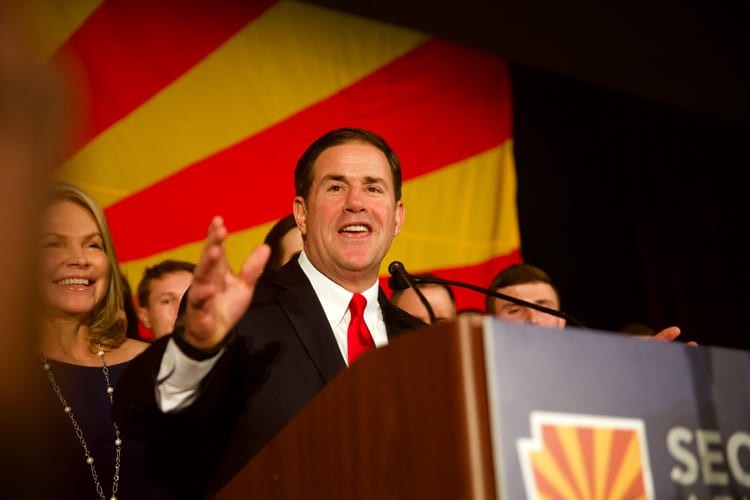This year, Arizona set goals and achieved them by working together to support Arizona’s top priorities. From passing bipartisan legislation to combat the opioid epidemic to restoring recession-era cuts to education, rewarding Arizona teachers with a 20 percent raise by 2020 and supporting public safety.
2018 was a year of growth and investment for our state. Click below to watch a video recap of Arizona’s 2018 “Year in Review.
KEY HIGHLIGHTS
INVESTING IN STUDENTS AND TEACHERS: Arizona made major investments in education, with a 20 percent boost in teacher pay over the next three years and a commitment to fully restore $371 million in recession-era cuts to Additional Assistance over the next five years to help update curriculum, modernize classroom technology and increase support staff salaries.
Additional education investments included $1.8 million to fund career and technical education, $10 million for behavioral health specialists, $53 million for building renewal to improve school infrastructure – the highest funding level since 2007 – and $86 million over two years for construction of new schools.
Arizona legislators from both parties also came together to extend Proposition 301 for 20 years, protecting a $667 million a year funding stream to Arizona schools.
ADDING NEW SCHOOL BUSES: In June, Governor Ducey released a $38 million plan to purchase an estimated 280 school buses from settlement funds from the Volkswagen Environmental Mitigation Trust. In the first round of awards, 55 school districts and charter schools received approval for the purchase of 142 diesel and alternative fuel school buses, totaling $15.9 million.
GROWING JOBS AND OPPORTUNITY: This year, 85 companies worked with the Arizona Commerce Authority (ACA) to expand to or relocate in Arizona, including names like Deloitte, Allstate, Nikola Motors, Amazon, Infosys, Voya Financial and Valor Global. Announcements from companies that worked with ACA represent nearly 26,071 projected new jobs in Arizona and roughly $5.141 billion in investment over five years.
Since 2015, over 278,000 jobs have been added and projections show employment growth will continue to outpace the national average. According to Arizona State University’s Annual Economic Forecast, Arizona is projected to add about 71,000 jobs in 2019. This year Arizona ranks fifth among the states for personal income gains, sixth for gross state product or output and seventh for job creation.
PROMOTING INNOVATION: Arizona became the first state in the nation to establish a regulatory sandbox allowing startups and entrepreneurs in the fintech sector to test new financial products without incurring regulatory burdens that might otherwise hamper innovation.
During the 2018 legislative session, Governor Ducey also signed into law a bill authorizing companies to hold and share data using blockchain technology, continuing Arizona’s leadership in blockchain innovation.
CUTTING REGULATORY BURDENS: At the beginning of the year, a moratorium was reissued on regulatory rulemaking by state agencies for the fourth year in a row to help guarantee a stable regulatory environment for existing and prospective companies.
With the Food Truck Freedom Bill, food truck operators can now concentrate more on their customers than complying with varying regulations as they travel the state. This bill streamlines the operation of mobile food vendors by creating a statewide licensing framework developed by the Arizona Department of Health Services to establish a cohesive standard for health, safety and operating practices.
PROTECTING OUR BORDER: The Arizona Border Strike Force continues to protect our communities with operations to stop a significant amount of dangerous drugs, weapons, traffickers and criminals from entering Arizona and devastating more lives. In the FY2019 budget, $2.9 million was invested in for additional troopers to protect our communities.
Governor Ducey also participated in a White House panel discussion, joined by members of Congress, Customs and Border Protection and Immigration and Customs Enforcement officials and Cochise County Sheriff Mark Dannels on the important role law enforcement agencies play in securing our southern border and keeping U.S. communities safe.
Collaboration among state, federal and local officials is critical in keeping our border safe. Governor Ducey welcomed the administration’s authorization to deploy the National Guard troops to enhance border security efforts. Shortly after the initial deployment, Governor Ducey visited the border with Homeland Security Secretary Kirstjen Nielsen to see firsthand how agencies are working together to protect Arizona’s southern border.
COMBATING OPIOID ADDICTION: 2018 started with a special session and the unanimous passage of the bipartisan Arizona Opioid Epidemic Act. This legislation takes action in addressing opioid addiction by holding bad actors accountable, expanding access to treatment and providing life-saving resources to first responders, law enforcement and community partners.
With the Opioid Action Plan in place, the governor was able to end the formal emergency public health declaration he issued in 2017 and declared that Arizona’s commitment to addressing the opioid epidemic remains unwavering.
In 2018, Arizona saw a:
• 36% decrease in the number of opioid prescriptions, compared to 2016;
• 60% decrease in the number of patients potentially doctor shopping, compared to July 2017;
• 58% increase in the percent of overdoses referred to behavioral health providers, compared to July 2017;
• 296% increase in the number of naloxone doses dispensed by pharmacies, compared to September of 2017; and
• 37% increase in the percent of providers who are checking the Controlled Substances Prescription Monitoring Program, compared to July 2017.
PROVIDING SECOND CHANCES: Arizona has made progress in efforts to reduce recidivism. The FY2019 Budget provided $1.7 million to expand addiction treatment at prisons. The budget also invested nearly $450,000 to expand Second Chance Centers at Lewis and Perryville prisons, allowing an additional 975 inmates to participate in the programming.
Since the program began in 2017, 1,692 inmates have graduated from a Second Chance Center — resulting in 808 job opportunities upon leaving prison. Currently, 337 inmates are participating in the program, and 95 employers are partnering with the centers in offering jobs to released inmates.
KEEPING ROADS SAFE: In 2017, a pilot program with the first-in-the-nation wrong-way driver alert system was deployed to provide faster response times and reduce the risk posed by wrong-way drivers. The success of this program has been recognized this year by the National Operations Center of Excellence, an organization focused on highway management and GCN, an information technology industry magazine.
To further protect public safety, $1.4 million was invested in the Fiscal Year (FY) 2019 budget for additional troopers for the Department of Public Safety’s Wrong-Way Driver Night Watch. In addition, after calling for a more aggressive approach to curb wrong-way driving at the beginning of the year, Governor Ducey signed a law to make it a felony offense to drive the wrong way on an Arizona highway under the influence of drugs or alcohol.
In 2016, the life of Pamela Hesselbacher was tragically cut short by a reckless driver who was driving with a suspended license. To close existing loopholes that prevented the driver in this case from facing felony charges, Governor Ducey signed Pam’s Law to improve public safety by imposing stricter penalties on those who drive with a suspended license and commit traffic violations that result in serious injury or death.
STRENGTHENING ARIZONA-MEXICO RELATIONSHIP: 2018 also highlighted Arizona and Mexico’s growing partnerships, starting with SkyBridge Arizona — the nation’s first international air cargo hub to house both Mexican and United States customs.
Governor Ducey and Sonora Governor Claudia Pavlovich also signed several agreements to promote safety and economic development in the region. This included promoting safety on the highway leading to beaches in Puerto Peñasco with a safety corridor with road signs that have safety messages in Spanish and English.
Later in the year, Governor Ducey attended the Comisión Sonora-Arizona/Arizona-Mexico Commission (CSA-AMC) 2018 Summit in Hermosillo, Sonora and attending the inauguration of Mexican President Andrés Manuel López Obrador and meeting with newly elected officials in Mexico City.
SUPPORTING FIRST RESPONDERS AND VETERANS: The Officer Craig Tiger Act went into effect, increasing the number of counseling sessions that must be covered for first responders who experience a traumatic event on the job.
Arizona also invested $8 million in new dollars to expand the capacity of soon-to-be-built veterans homes in Yuma and Flagstaff. $2 million was also invested to increase the level of military retirement pay exemption from $2,500 to $3,500.
TOP DESTINATION: This year, Arizona had some big announcements related to sporting events and tourism. Arizona already hosts top sporting experiences with the Cactus League Spring Training and the Waste Management Phoenix Open and now in 2023, Super Bowl LVII will be coming to Arizona and in 2024, the NCAA Final Four will take place in Arizona.
Along with being the premier place to host the world’s greatest sporting events, it was announced that in 2017, more people visited Arizona than ever before — our state welcomed 44 million visitors who collectively spent nearly $23 billion.




